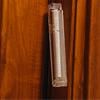One day, I arrived back to my dorm room in between classes at UCLA, to find that my mezuzah was missing from the doorframe. Though concerned, I had no time to investigate, as I was due at my next class, where we were having a guest speaker from another state, one who often taught classes on various Jewish subjects. After the class I told her my plight, whereupon she told me this story about a student from her hometown.
Recently, this college student had expressed a desire to have mezuzot on her doors. The professor kindly arranged to help her. She went to the student’s apartment, which was located in a large building where most of the residents were not Jewish. The professor helped the student affix kosher mezuzot to each of her doors, including of course her front door, which faced the common hallway of the building.
Some time later the professor again visited the student for a class gathering. But when she approached the apartment, she did not see the mezuzah. Upon entering, she noted that the mezuzah was still up, but that the girl had changed its place. Instead of being on the outside of the door, she had reattached the mezuzah on the inside, so that it was visible only from inside the apartment itself.
In answer to the professor’s private inquiry, the student explained that her Jewish girlfriends had criticized her for putting up the mezuzah in such a public place. They told her that it wasn’t very PC to push a Jewish symbol in the face of everyone who passed by, and that it wasn’t necessary. Why must she attract attention like this, and irritate her non-Jewish neighbors?
At this point I began to sputter, thinking that perhaps the professor was trying to justify my mezuzah being gone, but she merely smiled at me and continued her tale.
The student was all in a tizzy. She had learned that one must put mezuzot on the doors, but did it matter on which side they hung? She thought it must be okay to just change the position a few inches.
Although it bothered her that, in this day and age, a Jew could be intimidated into not showing her Jewishness publicly, the professor didn’t answer her directly at the time. Because she didn’t want to appear harsh or judgmental, she decided to wait for an appropriate time to discuss the issue further with the student.
As we were speaking, students for the following class began to pour into the lecture hall. So the professor graciously agreed to continue our talk outside in the campus square.
A short time later—she continued—the student excitedly told her that she had returned the mezuzah to its former place on the outside of the door.
It seems that a package had come for her in the mail, but she wasn’t home at the time it was delivered. The mailman left her a note, explaining that he had left the delivery in an upstairs apartment, since he knew the occupant was a trustworthy person.
Going up the stairs to retrieve her package, she realized that this was the apartment of an elderly man whom she occasionally passed in the hallway. The old man opened the door and, recognizing her, asked her to come in so he could give her the package. After she took it, thanked him for his trouble and was about to leave, the man said to her, “Shalom.”
“Oh, you’re also Jewish,” she said, for she had always thought that he wasn’t. Immediately the old man’s demeanor changed. His eyes clouded over with bitterness and anger. He started mumbling to himself, “Yes, a Jew . . . a curse . . . a plague on my life . . . I am a Jew, an unfortunate Jew . . .” Slowly he became more coherent and told the girl the story of his life.
Like so many others, he had lost his entire family during the Holocaust. His wife and children were suffocated in the Nazi gas chambers. He was the only one to survive. Since then his life had been bleak, a numbing succession of days and years of loneliness and pain. Ever since the war he had tried to avoid anything Jewish, even to the point of not revealing his true identity to others.
The girl stood in the doorway wondering what to say. Nothing seemed appropriate. Suddenly, in a gentler voice, the old man asked, “Why, dear girl, did you remove the mezuzah from your door?”
As if he were talking only to himself, the old man said that when the mezuzah was still hanging on her door, he used to sneak downstairs when the corridor was empty. He would stand in the corner near her door and kiss the mezuzah and weep. He said that his heart would find solace and some of his pain would be lifted away.
And that, explained the student to the professor, was why she returned the mezuzah to its rightful place.
As I had listened to this drama of the mezuzah of another girl from another place unfold, the day had passed into twilight. The professor fell silent as she waited for me to contemplate her story. The night wind began to stir, but I was reluctant to leave her to return to my forlorn room. I couldn’t help but exclaim, “That’s beautiful, no, beyond beautiful; but what about me?”
As she waved and turned to walk away, she laughed. You must trust in Divine Providence too.
I pondered that for a moment, and after checking my wallet for my credit card, I decided to take matters into my own hands and go buy a new mezuzah. As I was about to drive off, a student who lives in my dorm approached me. I hardly knew her.
“Did you get my note?” she asked. “I passed by your room this morning and noticed your mezuzah hanging loose, so I decided to keep it safe for you.”








Join the Discussion